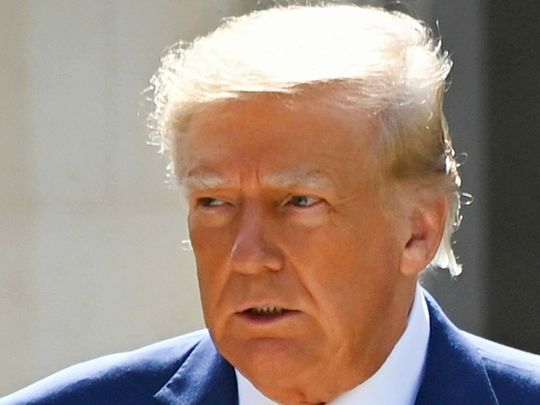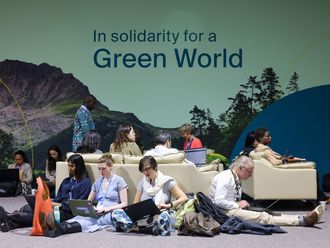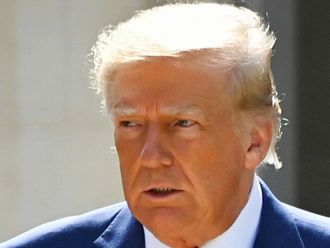
All eyes are on the United States, where Donald Trump has emerged victorious in the presidential election.
Heavily influenced by political decisions, experts claim, the future of climate action is at a crossroads, as the US stand on related policies will significantly impact global efforts to combat climate change and achieve the 2030 targets set under the Paris Agreement.
In 2015, during Barack Obama’s presidency, the US pledged to curb emissions between 26 and 28 per cent by 2025. To facilitate the US participation in the treaty, all 194 countries promised emissions reductions even though most had not contributed to climate change.
However, Trump, during his first stint at the White House, made a U-turn, announcing to withdraw from the treaty. He stated that the document allowed countries like India and China to continue using fossil fuels, while it imposed heavy restrictions on the US.
Terming the agreement unfair, he dismantled Obama’s modest initiatives to reduce fossil fuel consumption and greenhouse gas (GHG) emissions, weakening the pact.
Read more by Dr Abdullah Belhaif Al Nuaimi
Trump also refused to fund the global climate change initiative, including the Green Climate Fund (GCF) to help developing nations adapt to climate change and move to low-carbon technologies. This was the key feature entrusted to developed countries, including the US, to support developing nations.
Becoming the only country to withdraw from a global solution to a global problem, the US raised questions of trust.
However, in 2021, President Joe Biden re-entered the country into the Agreement.
The current dilemma
There are huge expectations from the ongoing COP29 climate summit in Baku, Azerbaijan.
Though the Biden administration is sending a delegation with officials from more than 20 US organisations, it is unlikely to make financial commitments, as Trump will take office in January. He intends to walk out of the treaty for the second time. This would reduce the country’s carbon-cutting obligation, crucial in transitioning to net zero.
The Trump-led Republican Party has historically prioritised fossil fuel production and been less supportive of stringent guidelines. With him at the helm, a potential shift in policy directions is foreseen and fate could repeat.
The Nationally Determined Contributions (NDCs) submitted by countries outline their plans to reduce GHG emissions, but the US’s less ambitious endeavour is widening the gap.
The recent stocktake of the NDCs has shown that while many countries updated their targets, the overall progress is insufficient to meet the goals.
Therefore, while setting bold objectives is critical, the real challenge lies in their implementation.
Disproportionate impact
During COP28 in Dubai, UAE, countries agreed to transition away from fossil fuels, a major cause of climate change, and one that made insignificant progress.
The climate is warming in all continents and ocean basins, which is a cause of extreme worry.
Carbon dioxide (CO₂) emissions from burning coal, oil and gas are the main cause of global warming. Therefore, governments must speed up efforts to ditch planet-heating fossil fuels. That’s because limits set in the Paris Agreement are crumbling.
Meanwhile, though several countries and companies are establishing carbon neutrality targets, zero-carbon solutions are becoming competitive across economic sectors. The trend has gripped the power and transport industries, creating new business opportunities.
While the private sector is increasingly moving towards renewable energy and sustainability, supportive government policies are essential to accelerate this transition. A veering support could hinder the growth of renewable energy industries and delay the adoption of cleaner technologies.
Warning signals
The current policies are on track for a temperature rise of 2.4°C, markedly overshooting the Paris Agreement target.
The UN Emissions Gap Report warns that without immediate and substantial emission reductions, the goals will be unattainable.
Besides, 2024 is the first to breach the 1.5°C warming threshold. Recent climate extremes including the devastating heatwave in India and catastrophic flooding in Spain and Brazil highlight the urgency of the crisis. These events are stark reminders of the intensifying climate emergency and its socioeconomic consequences.
The current results signify that it’s time to ensure how the Agreement could be amended to make it effective and enforceable.
COP29 offers a crucial platform for renewing global commitment to climate action, adopting innovative solutions, and ensuring that pledges translate into measurable progress. It has renewed its call for a climate finance goal.
The summit’s top agenda is a deal for up to $1 trillion in annual climate finance for developing countries, replacing the existing target of $100 billion.
It is crucial for the international community to remain committed and for nations to enhance their climate actions to ensure a sustainable and resilient future.
As Arunabha Ghosh, CEO of the Council on Energy, Environment and Water, said at COP29, “Climate finance must be consistent, convenient, catalytic, and credible. No developed country has delivered 100 per cent of its pledged climate finance. As we debate the New Collective Quantified Goal, the question is not just how much is needed, but how reliably it will be delivered.”
(Next week, the author will explore the pivotal role of COP21 in shaping the Paris Agreement)
Dr Abdullah Belhaif Al Nuaimi is Chairman of the Advisory Council of the Emirate of Sharjah











